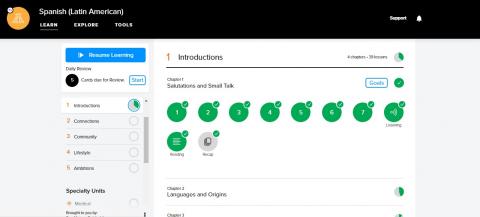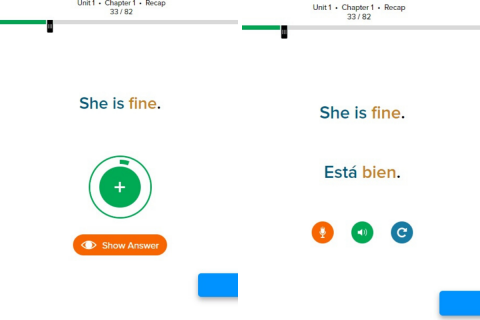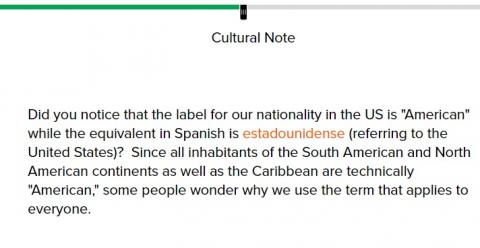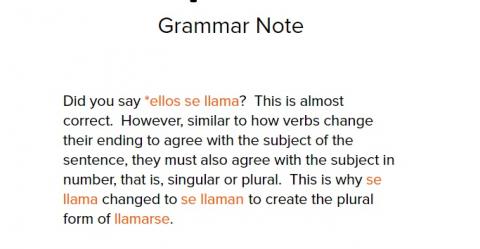
The library’s free language-learning program, Mango, offers the chance to learn dozens of language from across the globe, including Spanish, Mandarin, German, Japanese, and many others. Beginning the process of learning a language can typically be intimidating and overwhelming: You open up an app and see dozens of lessons and goals and grammatical terms like “verb conjugation” and “gender agreement”, and perhaps you feel a headache coming on. That's OK! We're here to convince you it's not that bad when you use Mango.
There might not be a better time to learn a language. With social distancing still ongoing and with more time at home, we're seeing a record number of people use Mango right now.
Aaron Gernes of the Des Moines Public Library tried Mango for 30 minutes a day for one week in order to best explain to you how the app works, and what makes it both fun and useful in everyday life.
What you need:
You can use Mango on your phone, tablet, laptop, or desktop computer. Though there are options that allow you to record yourself pronouncing a word or phrase and play it back to compare with a native speaker, you do not *need* a microphone of any sort to use and advance through Mango. The best part: There are no residency restrictions for Mango. Anyone with a Des Moines Public Library card or a DMPL digital card can use it.
Getting Started:
When I logged into Mango, I chose Spanish (Latin America) to learn. I have a cursory background in Spanish from middle school and high school but am not at all fluent. There are placement tests you may take if you feel you're advanced enough to start at a higher level, but I'm just going to start at the first lesson of the first unit.
When you first log in, you’ll notice Mango organizes lessons into units and then chapters. Each chapter has about 10-15 lessons, during which you’ll learn new phrases and conversational tips as well as receive culture notes.
Day One
The first unit is called Introductions, appropriately enough. The first chapter within that unit is called Salutations & Small Talk and consists of 7 lessons, plus a listening review, reading review, and recap.
Some language learning apps start off by drilling you with vocabulary and simple statements that aren’t very useful in real life. (How many times do you think you’ll tell someone “You are a boy”?)
With Mango, you immediately learn helpful phrases as well as grammatical pieces. Not only do you learn to ask “How Are You?” (¿Cómo está usted?), but in the first lesson, you learn to talk about the weather with a phrase like “What a cold day!” (¡Qué día tan frío!).
I spend 30 minutes learning and repeating words and phrases in day one, and I finish chapter one by the end of the day. I can now tell everyone how hot, cold, or rainy the morning has been, as well as other small talk, such as ¡Qué tenga un buen día!, or “Have a good day!”
Day Two
Day two, like every day now, starts with a “daily review,” a handful of exercises to review what we learned yesterday. After about 15 minutes of work, I get to the end of the first chapter. The chapter ends with reading and listening exercises, where you try to put a conversation into context. You don’t necessarily know every phrase, but they are related to others you’ve learned. After those exercises, there’s a long recap to go through everything we’ve learned. I start chapter two, Languages and Origins.
One important thing to know about Mango is you are not scored or graded. There are daily reviews and chapter recaps, but you are never given a quiz or exam. Instead, you will learn a word or phrase, then repeat it and its component parts over and over again throughout the lesson.
Mango does prompt you to recall information on your own. You’ll be asked to translate a phrase as a timer runs down. If you recall it, click “reveal answer” to see if you were right. If you were incorrect, there is no penalty and no score or grade is impacted. You can even go back right away during the lesson to really focus on a particular part of the lesson. In this way, Mango is very self-guided. There’s no rush to fly through parts you don’t understand, and nothing holding you back from new lessons each day.
Day Three
I complete chapter two today, finishing off the recap. I can tell people I speak English (Hablo inglés), ask where someone is from in a formal setting (¿De dónde es usted?), explain that my friend is Canadian (Él es canadiense), and more. As you can see, these are very practical phrases that I’m building upon that would be useful if I were to travel.
Another great Mango detail is the cultural notes that are provided. While some notes are intriguing history lessons, others explain important facts about grammar and vocabulary. For example, take a look at the above note about using estadounidense if you consider yourself American.
Day Four
I start chapter three, Introductions and Professions, where I learn to ask a person’s name, find out the proper way to introduce myself, respond to someone else’s introductions, and more.
Admittedly, some of the grammatical details are starting to get a bit tricky. However, Mango has nice notes scattered throughout their lessons to help explain sentence structure and the like. Because it’s self-guided, if I feel like I’m not getting something, I just go back and practice again and again.
Day Five
I finish chapter three and begin on chapter four, learning how to give personal information like my phone number, address, and email address, as well as talking about my favorite colors, foods, and other preferences.
By this point, I’m in a groove. I’ve settled into a daily routine, where, for 30 minutes a day, I focus on just learning Spanish. Here are a few tips I’d recommend:
- Repeat each phrase. If I’m asked to give a phrase or word, I say it, and reveal the answer. If I'm correct, I still repeat it two more times. If I’m wrong, I repeat the phrase three or four more times, drilling it into my head
- Don’t hesitate to jump back. If something doesn’t make sense, go back in the lesson. Repeat the phrase, listen to the narrator talk about it. Read the cultural and grammatical notes again.
- Don’t forget about daily reviews! If you forget something or answer something incorrect, be honest about it. Mango will put that card at the end of the stack for you to try again. These cards are a great way to make sure you don’t forget old skills.
- Build a daily routine. Carve out the time. If it’s only fifteen minutes a day, five days a week! It’s important to make sure you can continuously practice your skills.
- Just as important as repeating phrases is hearing them. A simple pair of headphones can make all the difference in that regard. If you don’t have a quiet space where you can head to while reviewing skills, pop in your headphones.
Day Six and Seven
I happen to have some time over the weekend, so I’m able to get thirty minutes of practice in each day. I finish unit one! My journey, however, has just begun. Whereas as unit one had just four chapters, each of the next four units have at least nine chapters, with several lessons within. There are also special units I can explore – learning how to text in Spanish, or talk about medical or legal issues. These topic-based lessons are shorter and cover more specific, need-based ground.
So far, I’m excited about my language-learning journey. I can do this pretty much anywhere, I feel like I can have simple conversations, and I’m learning all this for free! Hopefully this helped you learn more about Mango as well. It’s a lot of fun, and it’s free! Check out our Mango page to learn more and to get started.
Last Modified April 09, 2025
Type:
Home Page


